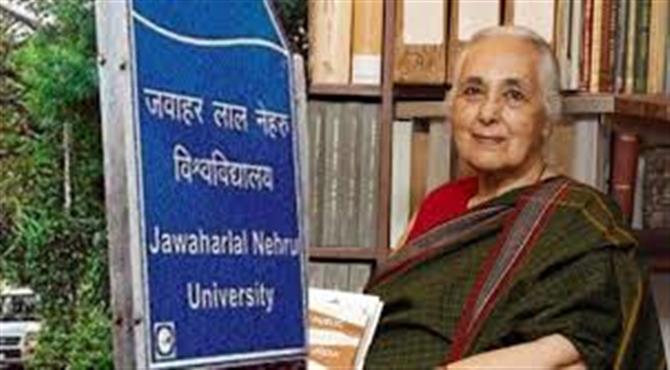Two eminent Indian women shows us the way how to protect dignity self-esteem
By Chanchal Manohar Singh
This blog is about country’s two eminent women, who are in news for two different reasons, but both have stirred the nation’s conscience by asserting themselves, when both of them found that they have not been given the treatment, both have deserved. The Madras High Court Chief Justice Vijaya Kamlesh Tahilramani, the senior most High Court judge in the country and Romila Thapar, 88, is a historian of international accomplishments and currently Professor Emerita at Jawaharlal Nehru University (JNU) in New Delhi. One can learn, a lot from the stand taken by these two county’s eminent personalities as how to maintain dignity and self-esteem.
The JNU authorities had asked Professor Romila Thapar to supply her fresh CV to the university, to which, she outrightly declined. Rather she resigned from the Professor emeritus position. Professor Thapar is a historian of international repute and has been world-wide known for her accomplishments in the field of history. If you compare the CV of JNU’s Vice Chancellor with that of the CV of Professor Thapar, Vice Chancellor’s CV or bio would look pale.
Vijaya Kamlesh Tahilramani, has put in her papers in the wake of a decision taken by the Supreme Court Collegium (comprising top five judges) to transfer her from the chartered High Court (97 Judges) to a relatively much smaller High Court of Meghalaya (less than 5 judges). She joined Madras High court on August 12, last year and was to retire in less than a years’ time.
Tahilramani made her decision public on September 6, during a dinner hosted by Madras High Court judges at the Tamil Nadu State Judicial Academy building in Chennai.
The JNU authorities had asked Professor Romila Thapar to supply her fresh CV to the university, to which, she outrightly declined. Rather she resigned from the Professor emeritus position. Professor Thapar is a historian of international repute and has been world-wide known for her accomplishments in the field of history. If you compare the CV of JNU’s Vice Chancellor with that of the CV of Professor Thapar, Vice Chancellor’s CV or bio would look pale.

Romila Thapar, Professor Emerita at Jawaharlal Nehru University ,New Delhi
Romila Thapar, has been under attack, when in January 2005, she declined the Padma Bhushan awarded by the Indian Government. In a letter to President A P J Abdul Kalam, she said she was "astonished to see her name in the list of awardees, because three months ago, when I was contacted by the HRD ministry, and asked if I would accept an award, I made my position very clear and explained my reason for declining it". Earlier, also, Thapar had declined the Padma Bhushan in 1992. To the President, she explained the reason for turning down the award: "I only accept awards from academic institutions or those associated with my professional work, and not state awards".
Romila Thapar (born 30 November 1931) is an Indian historian as well as an emerita professor whose principal area of study is ancient India. She is the author of several books including the popular volume, A History of India, and is currently Professor Emerita at Jawaharlal Nehru University (JNU) in New Delhi. Romila is the daughter of army doctor Daya Ram Thapar, who served as the Director General of the Indian Armed Forces Medical Services. The late journalist Romesh Thapar was her brother, while Karan Thapar is a cousin. After graduating from Panjab University in English literature, Thapar obtained a second bachelor's honors degree and a doctorate in Indian history under A. L. Basham from the School of Oriental and African Studies, the University of London in 1958.
She was a reader in Ancient Indian History at Kurukshetra University between 1961 and 1962 and held the same position at Delhi University between 1963 and 1970. Later, she worked as Professor of Ancient Indian History at the Jawaharlal Nehru University, New Delhi, where she is now Professor Emerita.
Thapar's major works are Aśoka and the Decline of the Mauryas, Ancient Indian Social History: Some Interpretations, Recent Perspectives of Early Indian History (editor), A History of India Volume One, and Early India: From the Origins to AD 1300.
Her historical work portrays the origins of Hinduism as an evolving interplay between social forces. Her recent work on Somnath examines the evolution of the historiographies about the legendary Gujarat temple.
Professor Thapar, has been a visiting professor at Cornell University, the University of Pennsylvania, and the College de France in Paris. She was elected General President of the Indian History Congress in 1983 and a Corresponding Fellow of the British Academy in 1999. She was elected a Member of the American Philosophical Society in 2019.
She was awarded the Jawaharlal Nehru Fellowship in 1976. Thapar is an Honorary Fellow at Lady Margaret Hall, Oxford, and at the School of Oriental and African Studies (SOAS), University of London. She holds honorary doctorates from the University of Chicago, the Institute National des Langues et Civilisations Orientales in Paris, the University of Oxford, the University of Edinburgh (2004), the University of Calcutta (2002) and recently (in 2009) from the University of Hyderabad. She was elected a Foreign Honorary Member of the American Academy of Arts and Sciences in 2009. She was also elected an Honorary Fellow of St Antony's College, Oxford, in 2017.[12]
In 2004, the US Library of Congress appointed her as the first holder of the Kluge Chair in Countries and Cultures of the South.
She is co-winner with Peter Brown of the Kluge Prize for the Study of Humanity for 2008 which comes with a US$1 million prize. (some facts about Professor Thapar taken from Wikipedia)